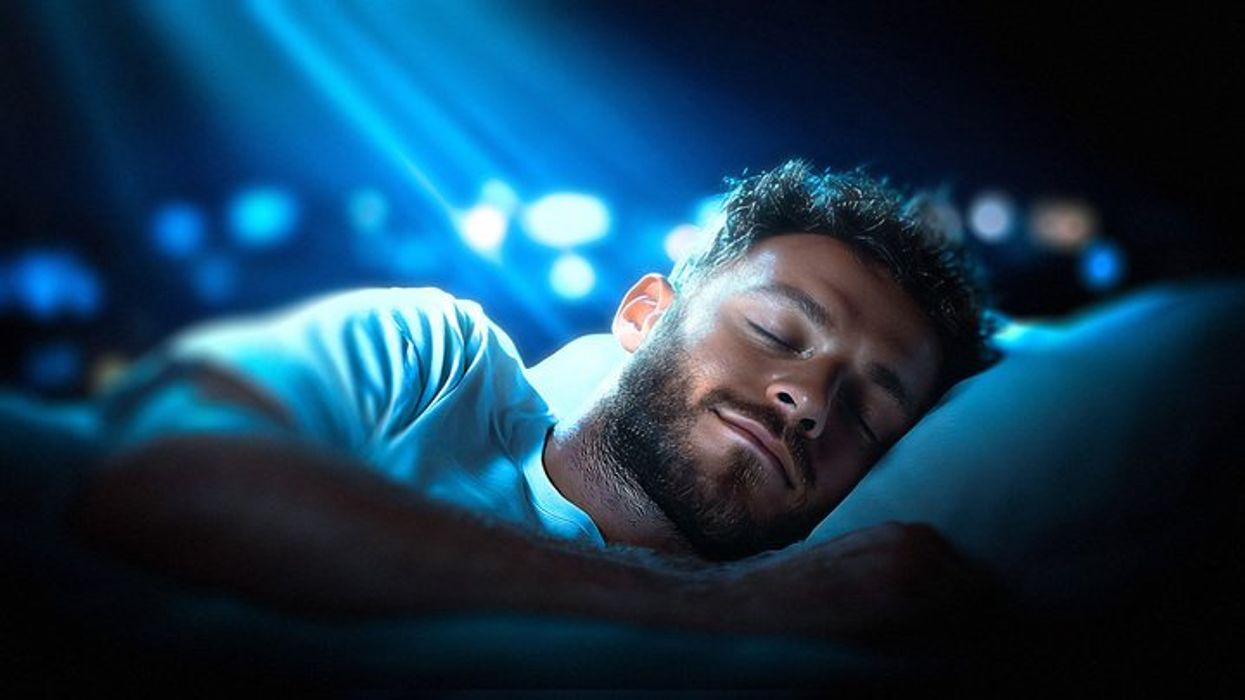© 2025 Blaze Media LLC. All rights reserved.
"I doubt that anyone seriously thinks we have 30 times as many crazy people as Britain or Australia. But we do have many, many more guns."
Today's Empire State Building shooting marks the 3rd shooting in the past 19 days.
Violence on this scale is cause for concern. One generally hopes that the number of people mentally ill enough to commit these kinds of indiscriminate acts of violence would be low, and that those people wouldn't all get the same idea at once.
Nevertheless, that is apparently what they are doing. The numerous shootings that have occurred since the infamous incident in Aurora, Colorado, at a screening of "The Dark Knight Rises," lack any coherent theme beyond simply an explosion of various pathologies.
Arguably, in an ideal world, the debate following these incidents would be how to cure those pathologies. Unfortunately, a different debate is likely to be raised, one about more gun control. So let's discuss the arguments.
Motives
Before laying out the arguments for and against more gun laws, it's important to consider the bewildering inconsistencies in the motives of the various killers.
Consider, firstly, the case of Wade Michael Page, the man who opened fire on a Sikh temple on the 5th of this month. Mr. Page, a "hate rock" aficionado, neo-Nazi and white supremacist, was practically the caricature of a deranged lone wolf shooter. Yet his attack, which left 7 dead, drew condemnations even from his fellow white supremacists. Page himself is dead due to his actions, though his girlfriend is in custody, and it is unlikely that his mental issues will ever be explained fully. However, one can argue easily that his actions were political, and undertaken on behalf of an ideology that calls for violent imposition of an intolerant worldview.
Which is precisely the opposite of the ideology apparently held by Floyd Lee Corkins II, the man who attempted to bring a gun and several Chick-fil-A bags of ammo into the Family Research Council. Corkins reportedly told the guard he shot, "I don't like your politics," referring to the Family Research Council's stance on gay marriage. In other words, while his shooting was also politically motivated, it was motivated in precisely the opposite direction - namely, Mr. Corkins wanted to shoot people because he thought they had an ideology that called for violent imposition of an intolerant worldview.
So while both Page and Corkins saw their acts of terror as making a political statement, those statements come from ideologies so distant that it would be impossible to ascribe any political trend to them. Barring any unforeseen revelations about the ideology of today's Empire State Building shooter (early reports suggest he was a disgruntled employee), that lack of a clear trend is likely to persist.
However, there is one political group whose message is likely to get a more sympathetic hearing in the wake of these explosions of violence, and that is the anti-gun lobby. For instance, the Brady Campaign Against Gun Violence wasted little time in releasing a statement in the wake of the Sikh temple shooting in Wisconsin, calling for "solutions to prevent gun deaths and injuries":
This is yet another powerful reminder of the need for a real national conversation about what we can do to prevent gun violence tragedies, and for our elected officials and presidential candidates to participate in that conversation by offering real plans to do something about it.There have now been 61 mass shootings since the tragedy last year in Tucson and 100 school shootings since the one at Columbine High School. Tomorrow, and the next day and the next, another 32 Americans will be murdered by guns.The American people from across the political spectrum are calling for solutions. We know that we are better than this.
In contrast, Family Research Council President Tony Perkins has called for a loosening of gun laws in the District of Columbia, so that self-defense against people like Floyd Corkins can become possible:
After the shooting at his Washington, D.C., office last week, Family Research Council President Tony Perkins asked the Republican platform committee Tuesday to help pressure the District of Columbia City Council to allow more people to carry guns.The platform committee unanimously agreed to put language to that effect in the Republican Party’s statement of principles.
“As we’ve seen in recent days, D.C. gun control laws — some of the most stringent in the country — cannot prevent criminals from engaging in violent acts,” Perkins said. “Citizens should be able to protect themselves.”
Now that the third shooting at the Empire State Building has happened, one has to wonder what the takeaway will be, and whether this rash of shootings is likely to engender a renewed interest in gun control beyond the rarified gun policy circles of DC. Either way, a review of the arguments on both sides of this debate is necessary.
The case for gun control
Organizations that support gun control, such as the Brady Campaign to Prevent Gun Violence and the Violence Policy Center, make a heavily data-driven case in favor of gun control. For instance, the Violence Policy Center claims that the states with the laxest gun laws lead the nation in terms of gun-related deaths:
The analysis reveals that the five states with the highest per capita gun death rates were Louisiana, Mississippi, Alaska, Alabama, and Nevada. Each of these states had a per capita gun death rate far exceeding the national per capita gun death rate of 10.34 per 100,000 for 2007. Each of the top-ranking states has lax gun laws and higher gun ownership rates. By contrast, states with strong gun laws and low rates of gun ownership had far lower rates of firearm-related death. Ranking last in the nation for gun death was Hawaii, followed by Rhode Island, Massachusetts, Connecticut, and New York.
The assumption on the part of this group is that because there is a correlation between lax gun laws and gun violence, therefore the former causes the latter, or at least facilitates it. This same logic is applied by advocates of gun control to the United States itself, as Fareed Zakaria did in a controversial Time Magazine article earlier this month:
Gun violence in America is off the chart compared with every other country on the planet. The gun-homicide rate per capita in the U.S. is 30 times that of Britain and Australia, 10 times that of India and four times that of Switzerland. When confronted with such a large deviation, a scholar would ask, Does America have some potential cause for this that is also off the chart? I doubt that anyone seriously thinks we have 30 times as many crazy people as Britain or Australia. But we do have many, many more guns.[...]The effect of the increasing ease with which Americans can buy ever more deadly weapons is also obvious. Over the past few decades, crime has been declining, except in one category. In the decade since 2000, violent-crime rates have fallen by 20%, aggravated assault by 21%, motor-vehicle theft by 44.5% and nonfirearm homicides by 22%. But the number of firearm homicides is essentially unchanged. What can explain this anomaly except easier access to guns?
Confronted with this blindingly obvious causal connection, otherwise intelligent people close their eyes. Denouncing any effort to control guns, George Will explained on ABC News that he had "a tragic view of life, which is that ... however meticulously you draft whatever statute you wind up passing, the world is going to remain a broken place, and things like this are going to happen." I don't recall Will responding to, say, the 9/11 attacks--or any other law-and-order issue for that matter--with a "things happen" sentiment.
Zakaria's article might have been plagiarized, but it raises several popular points among gun control advocates. "America has lax gun laws," the argument runs, "and when it's easier for everyone to get guns, it's also easier for the most insane people to get guns. Our gun violence can't be a coincidence!"
In the aftermath of all these shootings, those points may look extremely convincing, even to skeptics. For instance, Fox News' Bill O'Reilly tore into pro-gun Congressman Jason Chaffetz on his show in the aftermath of the Aurora shooting for contradicting these kinds of arguments:
If O'Reilly is prepared to accept these arguments, that could signal a serious backlash against gun rights. Certainly, that backlash is already in evidence on more liberal channels:
However, there are responses that can be given. Which brings us to...
The argument against gun control
The widespread idea that "guns don't kill people, people kill people" stands at the center of the argument against gun control. Moreover, a wide network of sportsman's organizations like the National Rifle Association (NRA) and libertarian groups like the Cato Institute aggressively argue that the issue is not whether criminals and/or the mentally ill can get their hands on guns, but whether the majority of people can get their hands on guns with which to defend themselves. The issue is, in this framing, a simple question of paternalism vs freedom. To quote the Cato Institute's David Kopel:
Gun control is based on the faulty notion that ordinary American citizens are too clumsy and ill-tempered to be trusted with weapons. Only through the blatant abrogation of explicit constitutional rights is gun control even possible. It must be enforced with such violations of individual rights as intrusive search and seizure. It most severely victimizes those who most need weapons for self-defense, such as blacks and women.
The National Rifle Association pushes this argument further, pointing out that a large percentage of the problem is not that people can get their hands on guns, but that most people are never trained to use them responsibly. Moreover, they argue that better reporting of the mentally ill could solve for most of the problems posed by mentally ill people acquiring guns in the first place. From the NRA's press release following the shooting of Congresswoman Gabrielle Giffords:
By all accounts, the accused Tucson assassin was a publicity-seeking, twisted, loner-loser who terrified his community college classmates and teachers to the point of being taken into custody by campus police and banned from school unless he cleared a psychiatric exam. Reportedly his parents had been warned by the police. He had a death shrine in his backyard. His former friends were frightened over what he'd become.Students in his classes--long before he joined the ranks of other loner-loser mass murderers--said they were afraid for their lives. Yet, nobody did the right thing. Nobody with the authority to seek mental observation and treatment for this "deeply disturbed" young man took advantage of the law. He was a prime candidate. Had the authorities acted appropriately, Jan. 8, 2011, would have been just another day in Tucson.
Instead, the sheriff nonsensically blamed talk radio and political activists. That theme was picked up by a lynch-mob media that desperately wanted to reverse the nation's new political dynamic.
In other words, "don't blame the gun, blame the insanity." This is a far cry from the "things happen" mentality alleged to exist by gun control advocates like Zakaria. It also could easily be applied to this month's rash of shootings, if you switched a few dates around.
Furthermore, anti-gun control groups have the idea of self-defense on their side. Even if Floyd Corkins shouldn't have had a gun, gun rights advocates will probably argue that it's difficult to see how this translates into an argument that he should have been allowed to rampage unchecked even with an illegal gun. It is also likely that the point will be raised that for every case like the shootings, there is also one like this incident, which reported in July:
Will this combination of self-defense-focused argumentation and demurring in the face of gun access work in the context of recent violence? Perhaps. It's certain to get a sympathetic ear from lawmakers like Jason Chaffetz, who argued the point with Bill O'Reilly in the aforementioned clip. Right or wrong, the gun lobby isn't going to go away, and neither is the gun control lobby, though one may have more power on Capitol Hill.
It is also worth noting that American support for stricter gun laws has consistently declined over time, according to the polling organization Pew. In fact, even in the aftermath of the Aurora shooting, opinions on the subject did not shift against gun rights by very large numbers:

In any case, this debate is just getting started, but it's unlikely to end any time soon, if this type of violence keeps up.
Want to leave a tip?
We answer to you. Help keep our content free of advertisers and big tech censorship by leaving a tip today.
Want to join the conversation?
Already a subscriber?
more stories
Sign up for the Blaze newsletter
By signing up, you agree to our Privacy Policy and Terms of Use, and agree to receive content that may sometimes include advertisements. You may opt out at any time.
© 2025 Blaze Media LLC. All rights reserved.
Get the stories that matter most delivered directly to your inbox.
By signing up, you agree to our Privacy Policy and Terms of Use, and agree to receive content that may sometimes include advertisements. You may opt out at any time.


